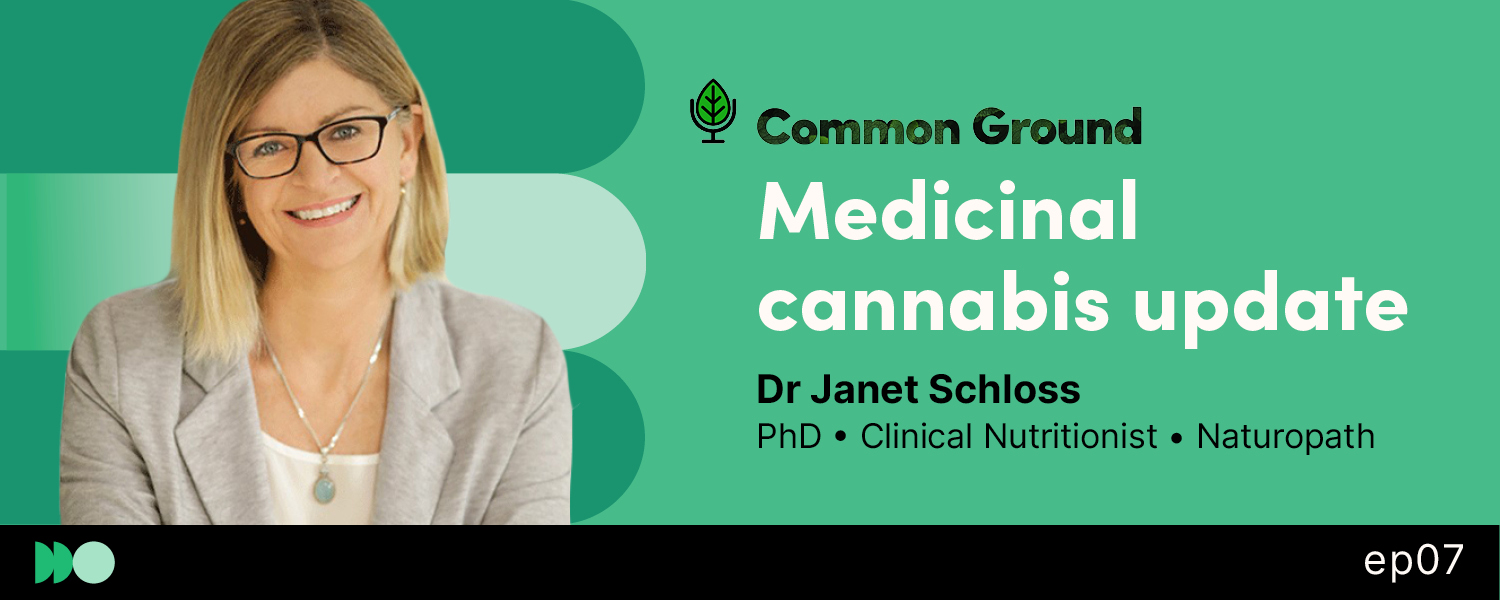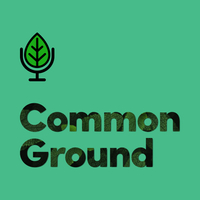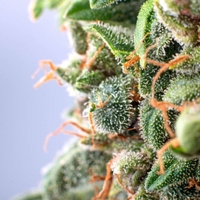
Listen on Amazon music | Apple Podcasts | Google Podcast | Spotify
Transcript
Jacqui Fahey (00:03):
Welcome to Common Ground, a podcast series discussing new research and interesting projects in the field of complementary medicine. Hello, my name is Jacqui Fahey, Head of Education at vital.ly. Medicinal cannabis exerts its effects mainly through the endocannabinoid system, which consists of many receptors expressed widely in both the brain and periphery, where they act to maintain balance in a number of processes, such as appetite, pain, inflammation, and gastrointestinal function. There are pathways for doctors to access medicinal cannabis products for their patients, however, a good few of these products are unapproved therapeutic goods, which means they have not been assessed by the TGA, the therapeutic goods administration, for its safety quality or effectiveness. This is a growing field with still many questions surrounding its accessibility, safety and usage.
Joining us today on Common Ground is Dr. Janet Schloss. Janet is a naturopath and nutritionist who has been in practice for over 21 years and completed her PhD at the school of medicine at the university of Queensland Australia.
Jacqui Fahey (01:16):
She has also lectured in Naturopathy at the Endeavour College of Natural health. Her main specialty is naturopathy and people who have cancer and chronic diseases, especially those going through conventional medical treatment. Janet has written chapters for various books, including Clinical Naturopathy by Sarris and Wardell and Cancer, a Biochemical and Nutritional approach by Henry Osieki. Janet has numerous publications in regards to cancer and auto-immune diseases, and she works closely with organisations such as the Mater Private Breast Cancer clinic and the Kim Walters choice program, giving nutritional seminars and advice. Dr. Schloss regularly conducts clinical trials with one of her latest projects where Dr. Schloss was the chief investigator for assessing the tolerability of medicinal cannabis and glioblastoma. Welcome back to Common Ground Janet.
Dr Janet Schloss (02:12):
Thank you so much. It's so great, it’s so great to be here, oh my goodness.
Jacqui Fahey (02:19):
Yeah. Thank you. So Janet the medicinal cannabis field is in quite the growth stage regards information, research, safety and prescribing guidelines. What are some of the latest regulatory developments?
Dr Janet Schloss (02:37):
Some really good ones that's actually happening at the moment, because at the beginning of this year, we actually saw a CBD actually down scheduled to what's called schedule three, which means that pharmacists can actually prescribe CBD to people. However, the problem is that there is no products that are actually registered with TGA that can be used as a schedule three at the moment. So with the regulation, most of the products are actually CBD, is still scheduled as a schedule four and schedule eight is anyone that actually has THC in it. The only ones that are actually registered for TGA are actually synthetic ones. We have no botanical cannabis products that are actually registered. So with this new regulation, what we're going to be seeing is CBD at a lower dose between 50 and 150 milligrams per day being able to be prescribed by pharmacists. Now to be able to achieve that, obviously we still need clinical trials to actually verify which products are there and at this stage, TGA also hasn't specified what conditions or instances that pharmacists can actually prescribe it. However, from what we have known is that most of the pharmacists will be able to prescribe things for generalisation, so not disease states at a higher level of canvas that's actually required. So, you know, things for, for sleep for anxiety, for pain and that type of thing, that they will be able to prescribe. And we're actually going to be conducting one of the trials looking at a schedule three with ‘ecofibre’ for sleep disturbances, which is actually quite exciting but for now that we still have a lot of work to do in Australia to actually get these products registered.
Jacqui Fahey (04:35):
Yes we do. So the botanical based is on the horizon for more research?
Janet Schloss (04:43):
Yes, absolutely. And I think like one of the problems that comes in is the, the variation with botanicals because is actually that whole plant type extract, you know, getting that consistency, which is what's actually required for a registered drug is actually quite, quite difficult, which is why the synthetic ones are obviously a lot easier because it's consistent throughout. But what we will, I think see is a lot more of the botanical mixtures coming through the trials and being able to be registered as drugs.
Jacqui Fahey (05:17):
Right. Okay. Could you explain the difference between the main medicinal compounds in cannabis So the cannabidiol (CBD) and the tetrahydrocannabidiol (THC), what the main differences are between the two?
Dr Janet Schloss (05:37):
Yeah, absolutely.There's over 140 different cannabinoids plus other the components that are actually in cannabis, like terpines and stuff like that. However, the main two that are being looked at and what's being standardised is what you've just said is the cannabidiol, the CBD and THC. So the main difference is that the CBD doesn't have any, what we call psychotropic or mind altering type effects, whereas the CBD or sorry, the THC actually does so, and that's where a lot of the difficulties come into. So THC is still because it does actually have that brain altering type effect in some instances. And it does cross actually both cross the blood brain barrier (BBB), but the THC also bind to the CB one receptors, which is part of your endocannabinoid system. It does have effect on the actual mind and it's what's actually known when people, you say use recreational cannabis as that high type feeling, whereas CBD doesn't actually have that at all .CBD actually doesn't bind to the receptors of the endocannabinoid system but can have a similar effect as our endocannabinoid system.
Jacqui Fahey (06:54):
Yes. Okay. Like a mimicking effect, is that it?
Dr Janet Schloss (06:59):
Correct Yes.
Jacqui Fahey (07:02):
And what are some of the therapeutic effects of medicinal CBD?
Dr Janet Schloss (07:09):
Yeah. So with CBD itself, it has been found and these are on studies that it does have an anti-anxiety effect. It does have an anti-psychotic effect, which is why it actually works really well with THC. It actually helps to mitigate some of the anti-psychotic type effect, anti-epileptic and neuroprotective in particular, anti-spasmodic, anti-ischemic, has been found to have some anti-proliferative effect or anti-cancer type effects, anti-bacterial intestinal protection has analgesic type effects, which has with the pain, it has anti-inflammatory type properties and also helps with some of the bones stimulation.
CBD actually has quite a lot of properties.
Jacqui Fahey (07:57):
Yes. And so what is the rationale for using CBD oil?
Dr Janet Schloss (08:03):
Number one is that CBD oil does not affect driving. It doesn't have that, the mind type, altering type effect. However, it does have a very calming type effect. It does actually have the anti-inflammatory type effect and it can be used a lot easier. It doesn't make people too drowsy, like the CBD actually, sorry, the THC actually does. So it is actually got a lot more functionality but a lot of people say it's a lot safer because it's the THC that actually has most of the side effects, actually nearly all of the side effects is, comes from THC. And it's the one that most people are more aware of. And because everybody responds differently, there's more likelihood that there can be what we consider to be adverse events or major side effects.
Jacqui Fahey (08:52):
Yes. Excuse me. Yes, that's right. And, and that's, what's going to ask you with CBD oil. I mean, are there any known adverse side effects,
Dr Janet Schloss (09:03):
A few with CBD, that's a good thing and I think that's where it's considered to be a lot safer. So, you know, some people may get a bit like diarrhea or digestive uncomfortability because it's still an oil based type of things, but nearly all of the side effects, like I said, is from like THC. So there's very few adverse effects from CBD and it usually has to be an extremely high amounts to be able to get side effect.
Jacqui Fahey (09:32):
Yes right. And are there different forms that you've one can take it in apart from the oil? Are there other forms or that's yet to be deciphered with the TGA as well?
Dr Janet Schloss (09:43):
No, there's actually a number of different forms at the moment. Most of them will actually come in a, either a liquid or a soft gel capsule. There's also one available that is a wafer. So you actually just put it into your mouth and it disappears. There's also a couple of novel type ones, which is like a nasal spray that can be delivered. So they actually comes in a range of different delivery systems these days.
Jacqui Fahey (10:11):
Fantastic. So how would one access medicinal cannabis in Australia?
Dr Janet Schloss (10:20):
It still has to be through a doctor. So a medical doctor, there are like specific doctors who just work within the cannabis system. So we have authorised prescribers, but any, any medical doctor can actually prescribe, like I said, the pharmacists have the ability to, but they don't have the access to a registered CBD drug at the moment. So if somebody wants to access it, they do need to go to a medical doctor. If that doctor doesn't actually prescribe some of that or doesn't feel comfortable prescribing any of the medicinal cannabis, they can actually give a referral to a doctor that is actually prescribing.
Jacqui Fahey (11:03):
And I've heard that supply is, can be difficult to, or can take a little bit of time once even the prescription is written up. Have you heard anything with regards to that?
Dr Janet Schloss (11:17):
Yeah, it does depend on like, whichever one, the doctor actually prescribed sometimes if they're not available or if the batch hasn't been prescribed, like hasn't been developed and they haven't developed the products, they can actually be delay sometimes with products. However, usually if the stock and the people actually haven't once they actually put their prescription in, it's actually a pretty quick turnaround. So once the prescription goes in, it's normally there within one to two days, which doesn't take long, except if the, if the company's out of stock at that stage.
Jacqui Fahey (11:54):
Sure. Where do you think the research is?
Dr Janet Schloss (11:55):
The only problem? And it's just making sure,
Jacqui Fahey (11:59):
Sorry. We had a bit of feedback just then. What were you sharing?
Dr Janet Schloss (12:06):
Oh, sorry. I was just going to say, it just depends on the company and how much demand and supply they actually have.
Jacqui Fahey (12:15):
True. And where do you think the research is needed and what type of research as we move further into this medicinal cannabis space?
Dr Janet Schloss (12:27):
You know, this is quite interesting. There's a lot of people say that there's a lot of research on cannabis already, but most of the research is actually in vitro. So I think that there's still a lot of things that we need to find out about cannabis. And I think particularly for the docs feel more comfortable with it. We need a lot more clinical trials. We need to find out, you know, why do some people benefit more from cannabis in certain instances compared to, to others? You know, what are the differences in it? Do they, you know, is it got to do with genetics? Has it got to do with different endocannabinoid systems they’re processing, and stuff of it you know, what does it work for and what doesn't it work for? You know, it's not like we have it out there, you know, that maybe it's a miracle type plant but it's actually not.
Dr Janet Schloss (13:15):
It's like any other plant that has specific indications for different areas. And I think we need definitely more good controlled, robust clinical trials in different areas to know, you know, what is going to work and what's not as well as, like I said, all those other components, you know, what is the intervariability of people that genetics endocannabinoid systems. And now we need more you know, the PK (pharmacokinetic) type work to find that out. So for me, I still think there's a lot of research needed. And the good thing is that there is a lot of more researchers out there now. And a lot of people putting in clinical trials and making this happen.
Jacqui Fahey (13:59):
Yes. And as chief investigator for assessing the tolerability of medicinal cannabis in glioblastoma, how did that project go?
Dr Janet Schloss (14:10):
Yeah, it went really well. So what we did find is that we did we had two different strengths, so there wasn't a placebo and it was over 12 weeks and one was a one-to-one and the other one was a four to one with a higher THC. We actually found that both were well tolerated. There was only three people who actually had to reduce some of their doses because of like, shaking or one person had like funny dreams at night time. But it was well-tolerated. It was also found to really be a benefit for sleep quality of life functionality. So all of those benefits, you know, in particular for a cohort of very poor prognostic outcome and how they function is really important to me, the actual trial was a success, which we're very lucky.
Jacqui Fahey (14:59):
That is great to hear. And you mentioned that you're about to engage soon on a medicinal cannabis and sleep, which I think is, is very interesting. I know a few colleagues that have mentioned the question, could that be appropriate for assisting people with regards to insomnia? So how far off is that study from starting?
Dr Janet Schloss (15:26):
Actually, it's not too far off. We've just got ethics approval for this particular study, which is why I'm quite happy to, to put it out there. So at this stage we're probably looking at starting in around June.
Jacqui Fahey (15:37):
Oh, fantastic. Very good. Well, we wish you all the best with regards to that project. And thanks Janet for sharing today on Common Ground.
Dr Janet Schloss (15:48):
Thank you so much for having me, Jacqui.






